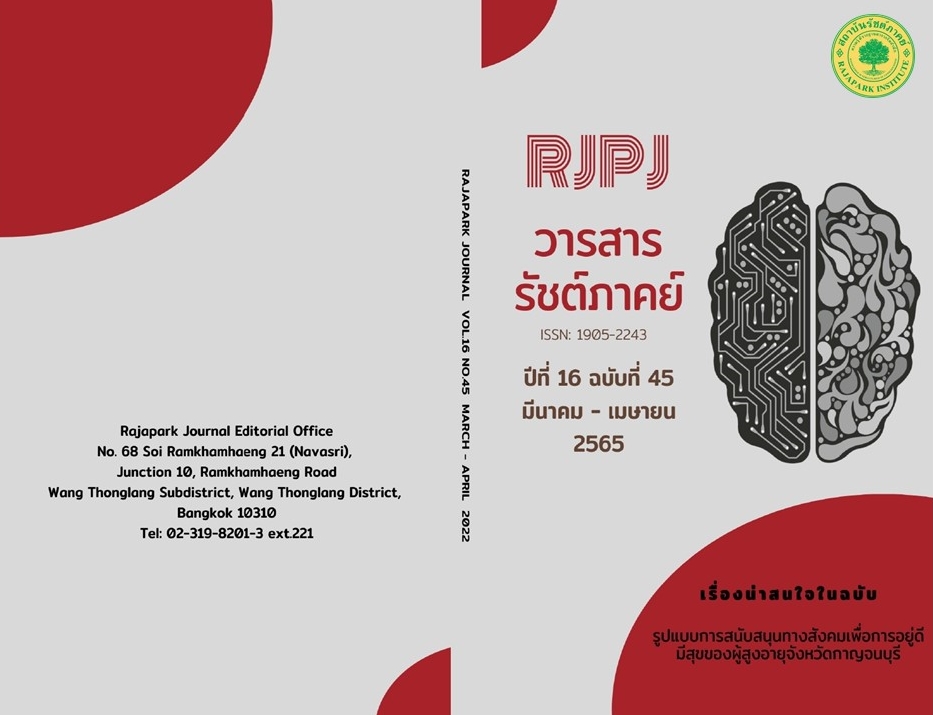Protection of the Right to Be Forgotten on the Internet: The Study of Search Engine
Main Article Content
Abstract
The objectives of this study were: (1) to study the problems and methods to protect personal data and the right to be forgotten by the internet search engines in Thailand; (2) to analyze the principles and practices under Thai and foreign laws to protect the right to be forgotten by the internet search engines; and (3) to recommend a proper guideline for protecting the right to be forgotten by the internet search engines in Thailand. This study employed a qualitative research method by analyzing legal documents such as law textbooks, articles, theses, court judgments, and online data from both local and foreign sources. The study found that the Personal Data Protection Act B.E. 2562 provides uncovered and unclear provisions on the right to be forgotten by internet search engines. The study recommends promulgating the regulations for exercising rights and providing exemptions for the right to be forgotten by the internet search engines explicitly at the secondary law level as an appropriate guideline for protecting the right to be forgotten by the internet search engines in Thailand.
Article Details

This work is licensed under a Creative Commons Attribution-NonCommercial-NoDerivatives 4.0 International License.
Views and opinions appearing in the Journal it is the responsibility of the author of the article, and does not constitute the view and responsibility of the editorial team.
References
Alessi, S. (2017). Eternal Sunshine: The Right to Be Forgotten in the European Union after the 2016 General Data Protection Regulation. Emory International Law Review, 32(1), 145-171. https://scholarlycommons.law.emory.edu/eilr/vol32/iss1/4
Bunaramrueang, P. et al. (2020). Thailand Data Protection Guideline 3.0. Bangkok: Chulalongkorn University.
European Data Protection Board. (2020). Guidelines 5/2019 on the criteria of the Right to be Forgotten in the search engines cases under the GDPR (part 1). Version 2.0. Retrieved October 15, 2020, from https://edpb.europa.eu/sites/edpb/files/files/file1/edpb_guidelines_201905_rtbfsearchengines_afterpublicconsultation_en.pdf
European Digital Rights. (n.d.). Key Aspects of the Proposed General Data Protection Regulation Explained: What are they? Why are they Important? What are Common Misconceptions? What can be Improved?. Retrieved November 20, 2017, from
https://edri.org/files/GDPR-key-issues-explained.pdf
Kantamanee, Y. (2019). Protection of the Right to Be Forgotten. Suthiparithat, 33(108), 14-26.
Leadford, J. L. (2009). Search Engine Optimization Bible (2nd ed.). Indianapolis: Wiley.
Lee, E. (2016). Recognizing Right in Real Time: The Role of Google in the EU Right to be Forgotten. Retrieved April 10, 2020, from https://lawreview.law.ucdavis.edu/issues/49/3/Articles/49-3_Lee.pdf
National Statistical Office. (2021). Summary the 2020 Household Survey on the Use of Information and Communication Technology. Bangkok: Statistical Forecasting Division National Statistical Office.
Rosen, J. (2010). The Web Means the End of Forgetting. Retrieved April 10, 2020, from http://www.nytimes.com/2010/07/25/magazine/25privacy-t2.html
Sangsuvan, K. (2021). The Right to Be Forgotten under the Personal Data Protection Act B.E. 2562. Mae Fah Luang University Law Journal, 4(1), 13-53.
Serirak, N. (2014). Privacy: Thoughts, Knowledge, Truth and Development on Personal Data Protection in Thailand. Bangkok: P. Press.
Verschaeve, S. (2020). Going Dark or Living Forever: The Right to Be Forgotten, Search Engines and Press Archives. Retrieved April 10, 2021, from https://papers.ssrn.com/sol3/papers.cfm?abstract_id=3669865


